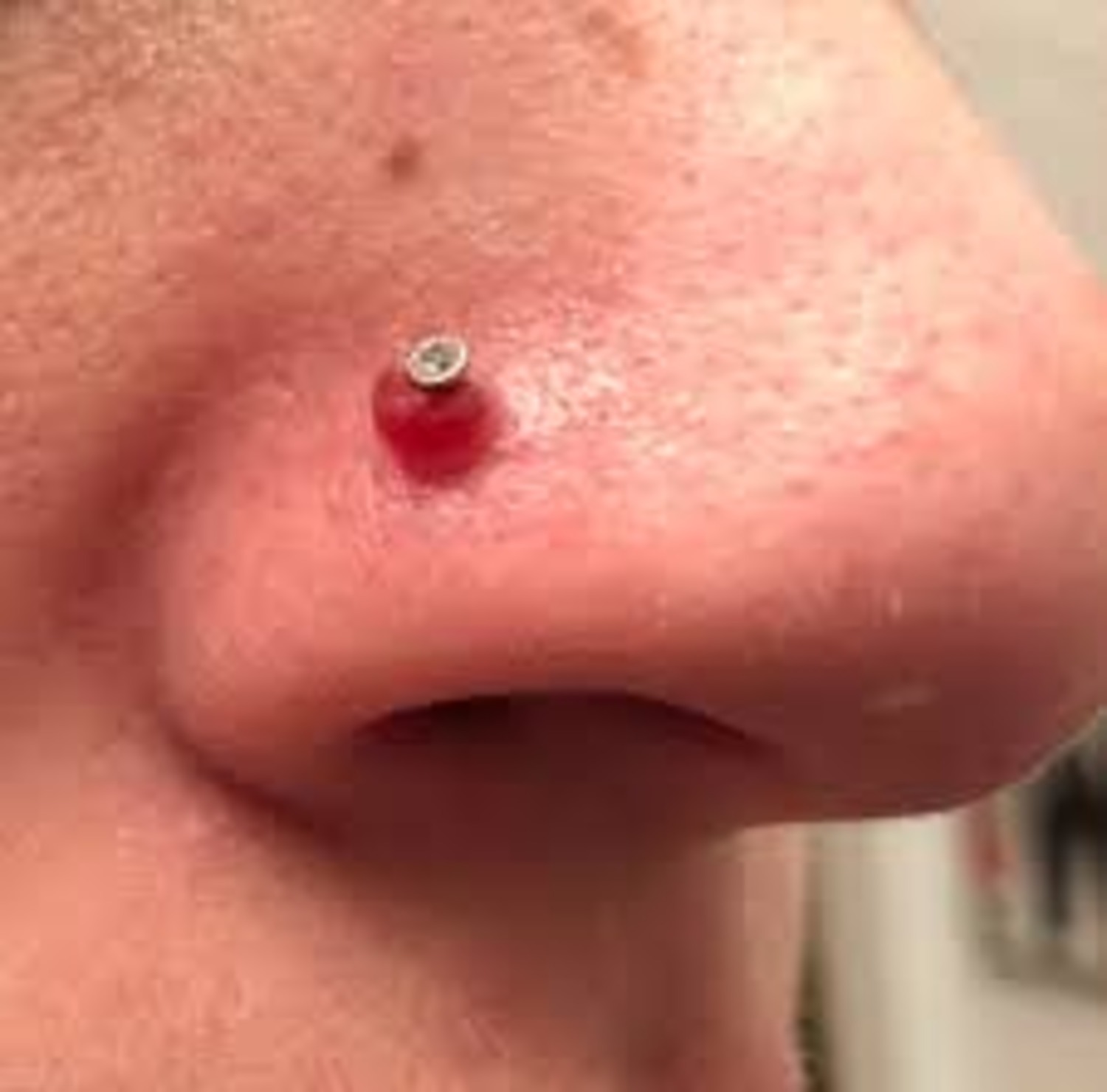There is a lot of incorrect information online about how to get rid of piercing bumps (aka granulomas). The truth is that there is no one-size-fits all cure.
- Salt Paste
Irritation bumps are just that, a small area of irritation that can form at the entrance or exit to a piercing. These bumps are a result of an overgrowth of granulation tissue and collagen. They are firm and rubbery in texture, and may vary in color depending on the irritant that caused them.
They are typically triggered by poorly placed piercings, ill fitting jewelry, or over-cleaning of a wound. Irritation bumps usually heal quickly if you remove the culprit, clean the area 2-3 times per day with a sterile saline wound wash, and avoid irritating the area in any other way.
A salt paste (boil some water, add a pinch of salt) and a warm compress are both good ways to soothe these bumps. Do not try to pop these bumps as they will most likely be filled with pus and can lead to infection. Tea tree oil diluted with a carrier oil like jojoba can also help reduce inflammation. Do not use any chemical products on a bump, as they will dry out the healing cells and damage the area.
- Aspirin Paste
There is an ocean of information about piercing bumps on the internet—it’s a keloid, it’s a granuloma, it’s infected—and most of it is wrong. The truth is that these bumps are normal and will go away with time, the right treatment, and TLC.
One of the most common remedies for piercing bumps is to crush and mix aspirin with a bit of warm boiled water to make a paste. This treatment can help reduce inflammation and unclog pores, which can encourage drainage if there is pus trapped inside the bump.
It’s a great idea to add some witch hazel to this mixture for its anti-inflammatory properties, as well as for its ability to soothe skin and provide nourishment. If your skin is dry, consider adding a few drops of jojoba oil or another hydrating face oil. This can prevent the aspirin from drying out your skin, which may lead to additional breakouts. The acetylsalicylic acid in aspirin is similar to salicylic acid, an active ingredient in some acne treatments. This helps reduce inflammation and unclog pores to reduce the formation of pimples. It’s also helpful in reducing pain and swelling associated with gout, rheumatoid arthritis, or sprains and strains.
- Tea Tree Oil
Tea tree oil is a volatile essential oil (an oil that evaporates when exposed to air) that is distilled from the leaves of Melaleuca alternifolia, a small plant native to Australia. For centuries, Aboriginal people crushed the leaves to extract the oil, which they inhaled to treat respiratory illnesses, and applied directly to skin for healing. Research now confirms the antibacterial, antifungal, and anti-inflammatory properties of tea tree oil.
It can be used alone or in combination with other natural ingredients to create a wide variety of home remedies. For example, a few drops of the oil mixed with jojoba or olive vegetable oil can be applied to a pimple and covered with an elastic bandage. It may take a few days for the spot to heal, but it is generally less irritating than benzoyl peroxide and salicylic acid, which are commonly used acne treatments.
However, direct application of pure tea tree oil may irritate sensitive skin and should be diluted before use. It is also important to test the oil on a patch of skin before applying regularly, particularly for those with sensitive pores.
- Dish Soap
Allergic skin reactions are painful and itchy, but they can often be treated at home. If the rash is severe, you may need to get medical help from a doctor. Allergic skin reactions are often caused by irritants, like fragrances, metals, plants, or everyday products like dish soaps. The best way to prevent these allergic skin reactions is to wear gloves when washing dishes and wash your hands well afterward.
If you are allergic to a particular ingredient in dish soap, you might notice itchy hands or a red, patchy rash that looks similar to contact dermatitis (often called eczema on the hands). These symptoms can occur a day or two after using dish soap that contains an allergen. It can also take several uses over a period of months or even years for you to develop an allergy to your dish soap.
To avoid this, look for soaps that are free of irritants and allergens, such as fragrance-free and preservative-free. You can also try washing your hands with plain soap, which is effective in removing grease and food oils from your fingers while being gentle on your skin.
- Vinegar
Vinegar is a versatile liquid that’s prized as a cooking ingredient and household cleaner. But it’s also a popular health elixir with many purported benefits, some of which are supported by scientific research.
Applied directly to the skin, vinegar is an effective antiseptic and can help kill bacteria that cause infections and irritation. It also has antifungal properties and can inhibit yeast that causes acne, dandruff, or nail infections.
Its high acidity level makes it important to dilute vinegar before applying it to the skin. Overuse of pure vinegar can lead to irritation or even burns. Moreover, it’s not safe for infants or babies because it can damage the skin and impede its natural pH levels.
Ingestion of diluted vinegar is thought to slow the breakdown of carbohydrates in the digestive tract, reducing blood sugar levels after meals and leading to better control for people with diabetes. But larger, longer-term trials are needed to confirm this. Also, excessive vinegar consumption can exacerbate conditions like heartburn or stomach inflammation. It can also reduce potassium levels in the body, potentially affecting blood pressure and heart health.

